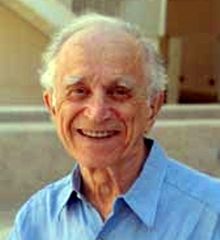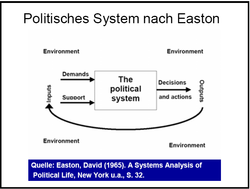- David Easton
-
David Easton Born June 24, 1917
Toronto, OntarioNationality Canadian Occupation Professor Known for Political systems theory David Easton (born June 24, 1917) is a Canadian political scientist who was born in Toronto, Ontario, went to the United States in 1943, and is currently Distinguished Research Professor in the Department of Political Science at the University of California, Irvine.[1]
He is a former President of the American Political Science Association, a past President of the International Committee on Social Science Documentation, and was for many years active in the American Academy of Arts and Sciences. At the forefront of both the behavioralist and post-behavioralist revolutions in the discipline of political science during the 1950s and 1970s, Easton provided the discipline's most widely used definition of politics and is renowned for his application of systems theory to the study of political science. During his career he has served as a consultant to many prominent organizations and authored numerous influential scholarly publications.
Contents
Education and career
Easton earned his undergraduate degree at the University of Toronto in 1939, his M.A. in 1943 and Ph.D. from Harvard University in 1947; an LL.D. at McMaster University in 1970 and he attended Kalamazoo College in 1972. He married Sylvia Isobel Victoria Johnstone and they raised one son.[2]
From 1944-1947 Easton was a teaching fellow at Harvard University. He was appointed assistant of political science at the University of Chicago In 1947; associate professor in 1953; professor in 1955; and was Andrew McLeish Distinguished Service Professor in Social Thought there in 1984. He was appointed Distinguished Research Professor in the Department of Political Science, University of California, Irvine in 1997. Easton was a member of the executive committee of the Inter-University Consortium for Political Research (1962–64); chairman of the Committee on Information and Behavioral Sciences Division, National Academy of Sciences-National Research Council (1968–70); and a fellow of the Center for Advanced Study in the Behavioral Sciences, Stanford University (1957–58). He has served as a consultant to The Brookings Institution (1955); the Mental Health Research Institute of the University of Michigan (1955–56); the Canadian Royal Commission on Bilingualism and Biculturalism (1964–66); and as a Ford Professor (1960–61), funded by a grant from the Ford Foundation. Easton also served on the editorial boards of the Journal of Political Methodology, Youth and Society, and International Political Science Abstracts, and was editor of Varieties of Political Theory (1966).[2]
Easton is a former President of the American Political Science Association (1968–1969), past President of the International Committee on Social Science Documentation (1969–1971), and Vice President of the American Academy of Arts and Sciences.[3] He was an active Behavioral Science Fellow of the American Academy of Arts & Sciences, serving as a council member (1975–1984), chairman of its Research and Planning Committee (1979–82), and a member of its Executive Board (1979–1984). He was a trustee and chairman of the and Academy of Independent Scholars (1979–81); a member of the Committee on Higher Education of the Royal Society of Canada (1978–80); and also served as chairman of the Committee on Scientific Information Exchange of the American Political science Association (1972).[2]
Scholarship
Easton has been described as one of the “first generation of behavioral revolutionaries” in the discipline of political science.[4] Like other early behavioralists, Easton initially sought to gain control over the masses of data being generated by social science research in the early 1950s, which they thought was overwhelming social scientists with quantitative and qualitative data in the absence of an organizing theoretical framework.[5] Easton argued for development of a proper science of political studies that would produce reliable, universal knowledge about social phenomena, and that the purpose of scientific rules of procedure was to make possible the discovery of a highly generalized theory of politics.[5] Easton’s vision was one of a “general theory” of political science that would consist of a deductive system of thought so that a limited number of postulates, as assumptions and axioms, a whole body of empirically valid generalizations might be deduced in descending order of specificity and provide predictive causal explanations of political behavior.[6]
Easton’s book The Political System drove home the failure of 1950s political science to build anything resembling coherent theories of politics or to develop systematic techniques for gathering and analyzing data, with which such theories might be constructed.[7] The most widely known and used definition of politics was provided by Easton in his identification of the political system with the “authoritative allocation of values for a society.”[8] This provided many political scientists with a useful guideline for delimiting the content of political science.
Some years later, after Easton became President of the American Political Science Association, he led the charge of a new post-behavioralist revolution, arguing that political science research should be both relevant and action-oriented, so it might better serve the needs of society by solving social and political problems revealed during the 1960s.[9] This new revolution was not a change in the methods of inquiry but a change in orientation that grew out of a deep discontent with the direction of contemporary political research and which advocated more attention to the public responsibilities of the discipline and to relevant research on contemporary political problems and issues. According to John Gunnell, this was the official birth announcement of the public policy enterprise in political science which became the basis of the self-image of orthodox political science in the 1970s. With this shift came a distinct de-emphasis of concern for establishing a general unified theory as the core of the discipline, and a retreat from any pointed confrontation with the history of political theory.[10]
Easton is renowned for his application of systems theory to political science, and for his definition of politics as the "authoritative allocation of value" in A Framework for Political Analysis[11] and A Systems Analysis of Political Life,[12] both published in 1965.
Easton’s principal research interest is in elaborating a systems analytical approach as a central means of understanding how political systems operate. In recent years he has turned to structural constraints as a second major element underlying political systems. He has written about the influence of political structure on various aspects of political life, on the state and development of political science, and on the political socialization of children.[3]
In a reputational study of political scientists published in 1978, Easton ranked fourth among those most prominent during 1945-1960, and second most prominent among those in the period 1960-1970.[13][14] In a subsequent reputational study based on number of times an author’s publications were cited in publications of others, Easton ranked seventh among the twenty most significant political scientist contributors in the period 1970-79.[15][16]
Selected publications
Easton has written several books and articles. A selection:
- 1951, The Decline of Modern Political Theory, in Journal of Politics 13.
- 1953, The Political System. An Inquiry into the State of Political Science, New York: Knopf.
- 1957, An Approach to the Analysis of Political Systems, in World Politics 9.
- 1965, A Framework for Political Analysis, Englewood Cliffs: Prentice-Hall.
- 1965, A Systems Analysis of Political Life, New York: Wiley.
- 1966, Varieties of Political Theory, (Ed.), Englewood Cliffs.
- 1969, Children in the Political System - Origins of Political Legitimacy, (with Jack Dennis), McGraw-Hill.
- 1990, The Analysis of Political Structure.
- 1991, Divided Knowledge: Across Disciplines, Across Cultures, (Ed. with C. Schelling).
- 1991, The Development of Political Science: A Comparative Survey, (Ed. with J. Gunnell, and L. Graziano).
- 1995, Regime and Discipline: Democracy and the Development of Political Science, (Ed. with J. Gunnell and M. Stein).
References
- ^ David Easton, Distinguished Research Professor, Political Science School of Social Sciences Regents of the University of California, 1997. Accessed 2-17-09.
- ^ a b c Who’s Who in America 1984-85, 43d ed. Chicago: Who’s Who, 1984, p. 908.
- ^ a b David Easton, Distinguished Research Professor, Political Science School of Social Sciences Regents of the University of California, 1997. Last updated 09-23-2008. Accessed 2-17-2009.
- ^ Ball, Terrence. “Political theory and political science: Can this marriage be saved?” Theoria: Journal of Social and Political Theory. Issue 113., August 2007, pp. 1-22, at p. 3.
- ^ a b Bevir, Mark. 2006. Political studies as narrative and science, 1880-2000.” Political Studies 54(October): 583-606 at 592.
- ^ Gunnell, John G. “Political Theory: The Evolution of a Subfield, ” p. 19. In: Political Science: The State of the Discipline, Ada W. Finifter, ed. Washington, DC: American Political Science Association, 1983.
- ^ Falco, Maria J. Truth and meaning in political science: An introduction to political inquiry. Columbus: Charles E. Merrill Publ. Co., 1973, 92.
- ^ Isaak, Alan C. Scope and methods of political science, rev. ed. Homewood, IL: Dorsey Press, 1975, 19-20.
- ^ Falco, Maria J. Truth and meaning in political science: An introduction to political inquiry. Columbus: Charles E. Merrill Publ. Co., 1973, 96-7.
- ^ Gunnell, John G. “Political Theory: The Evolution of a Subfield, ” p. 27. In: Political Science: The State of the Discipline, Ada W. Finifter, ed. Washington, DC: American Political Science Association, 1983.
- ^ Easton, David. 1965. A Framework for Political Analysis. Englewood Cliffs: Prentice-Hall.
- ^ Easton, David. 1965. A Systems Analysis of Political Life. New York: Wiley.
- ^ Roettger, Walter B. “Strata and Stability: Reputations of American Political Scientists.” PS 11:9, 1978.
- ^ Lynn, Naomi B. “Self-Portrait: Profile of Political Scientists,” p. 106. In: Political Science: The State of the Discipline, Ada W. Finifter, ed. Washington, DC: American Political Science Association, 1983.
- ^ Robey, John S. “Reputation vs. Citations: Who Are the Top Scholars in Political Science.” PS, 1982, 15:200.
- ^ Lynn, Naomi B. “Self-Portrait: Profile of Political Scientists,” p. 107. In: Political Science: The State of the Discipline, Ada W. Finifter, ed. Washington, DC: American Political Science Association, 1983.
External links
Categories:- 1917 births
- Canadian political scientists
- Living people
- Political theorists
- Systems scientists
- People from Toronto
- Kalamazoo College alumni
- University of Toronto alumni
- Harvard University alumni
- McMaster University alumni
- University of California, Irvine faculty
Wikimedia Foundation. 2010.


